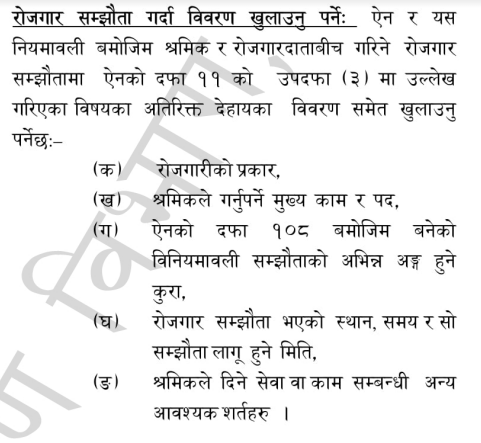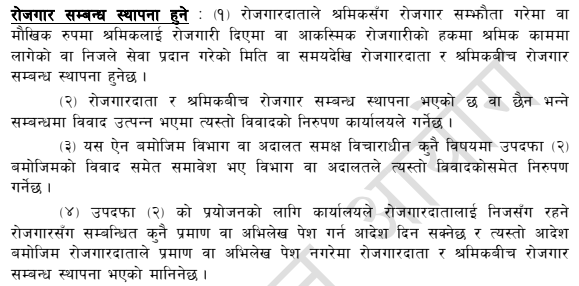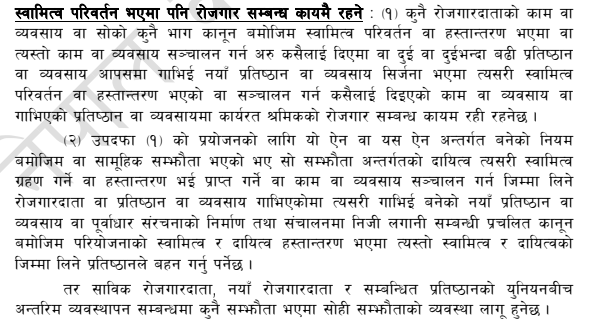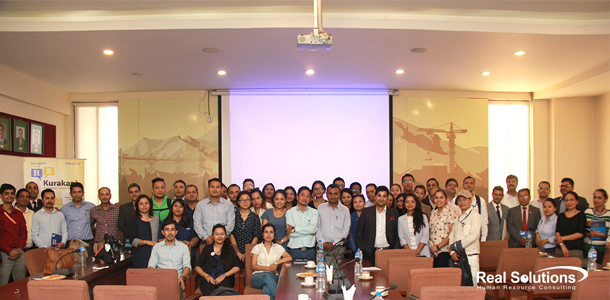An employment agreement is a signed document between the employer and an employee that establishes a relationship between them. It sets all the terms of employment, responsibilities, rules, expectations, and grounds for employee termination. It also includes any special or unique obligations the employee will have to undertake. An entity welcomes a newly joined employee by executing an employment agreement that binds them both.
Prohibition on employment without executing Employment Agreement:

As per Labor Act 2017, executing an employment agreement is mandatory and no employer can employ a person without a valid employment agreement.
Traditionally, an employment agreement is provided in a written form that requires to be acknowledged by both the employer and employee. Having said that, under the Act, anyone entering casual employment does not have to sign off a written employment agreement.
Casual employment means employment that the employer provides to the employee on the condition that the employee has to provide any service or perform any work, for seven days or less within a period of one month.
Details to be disclosed in the Employment Agreement

The agreement could be short or long depending upon the role of the employee, however, the objective of executing the agreement is best achieved by issuing a detailed written Employment Agreement to its employees. As per the Labor Act and Labor Rule, the following details need to be included while entering into an employment agreement:
Type of employment
An employment agreement should clearly mention the nature of the relationship between employer and employee i.e. type of employment. As per Labor Rules, 2075 following are the type of employment:
Work-Based Employment,
Time Bound Employment,
Casual Employment,
Part-time Employment.
Major responsibilities and position of the employee
This includes the job title, job description and key responsibilities of the employee.
It should be precisely mentioned that bylaws as per Section 108 of the Labor Act are an integral part of the agreement
Place and time of signing an employment agreement
The place of signing could be an indication of the place of work. The place and time of signing makes the document official.
The effective date of employment agreement
Effective date is the date of commencement of the employment. It is the first-day an employee actively starts working.
Remuneration
Remuneration is the basic remuneration to which employees are entitled, and this term also includes an allowance. The remuneration paid should not be less than the minimum salary set by the Nepal Government.
Benefits to be received by the employee
It includes perks other than salary, some common benefits are paid time off, fringe benefits, SSF etc.
Other terms and conditions of the employment
Conditions of employment and other matters as prescribed shall be set out in the agreement. Other terms may include names and addresses of the parties, hours of work, employee assessment reviews, probationary period, deductions, expenses, leaves, and notice period.
Foreign citizens employment
Foreign citizens that are to be hired in Nepal should be provided an employment agreement in a language that is in the English language or in the language the employee understands.
Establishment of the Employment relationship:

An employment relationship shall be established when in case of any of the following scenarios:
The employer and employee enter into a written employment agreement.
An employer recruits any person through a verbal agreement.
For casual employees, the relationship is established from the date or time when the employee starts working.
Any dispute with respect to the employment relationship between the employer and employee will be settled by the Labor Office.
Where the dispute does not get resolved in the Labor Office, the case will be settled by the Department of Labor or the Court.
For solving the dispute, the Office may give an order to the employer to submit any evidence or document relating to the employment if any. If the employer does not submit such evidence or document pursuant to the order, the employment relationship between the employer and the employee shall be deemed to have been established.
Relationship to continue even in case of Change in Ownership

In case the authority/business is handed over to any other person through a business transfer, change in ownership, or any other reason, the existing employer/employee relationship will continue despite the change in ownership.
Provided that if any agreement on interim management has been made between the previous employer, new employer, and union of the concerned enterprise, the provisions of the agreement shall apply.
Penalty in case of non-compliance

If any employee is being engaged in employment without executing a valid employment agreement, then such an employer shall be charged with a penalty of NRS. 10,000 and maximum up to 5,00,000.










